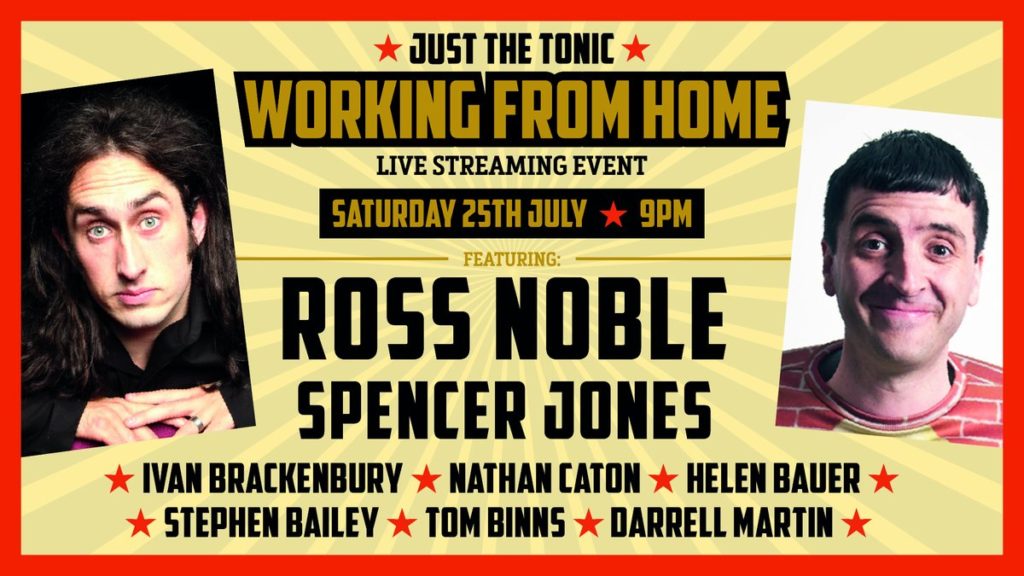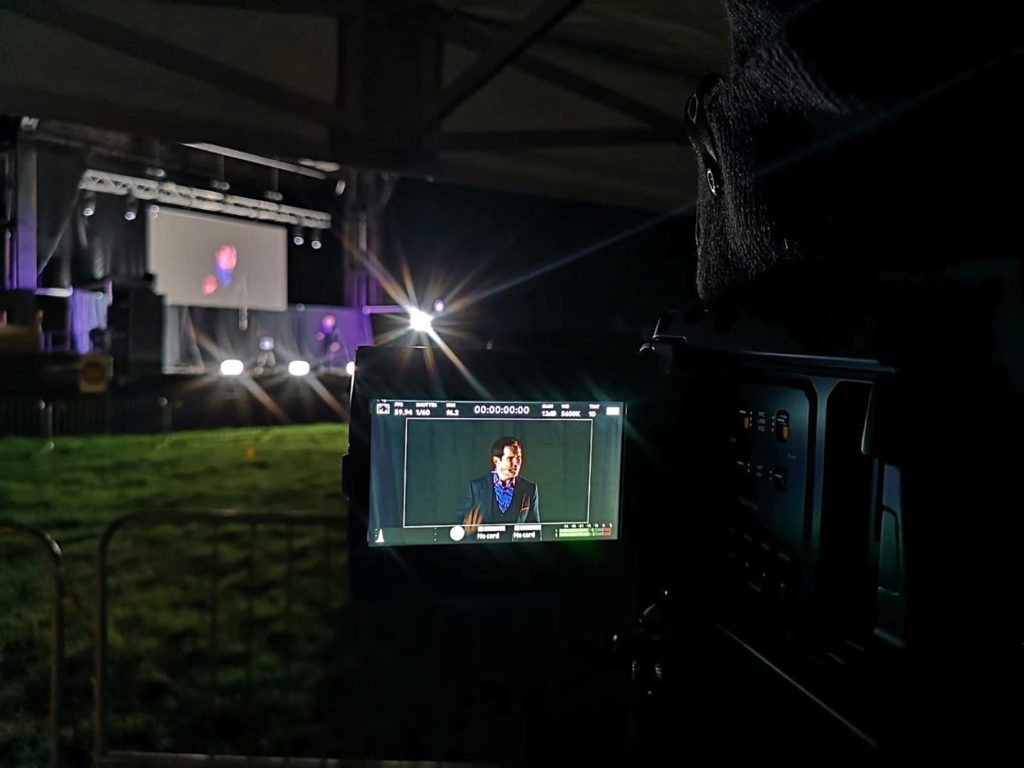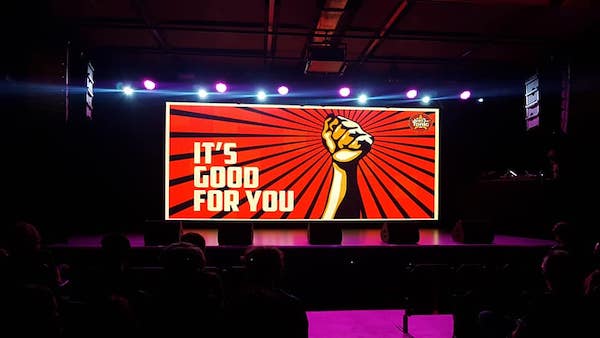Just the Tonic has been one of the leaders in the comedy industry when it comes to returning to live; from live streaming, to outdoor events and a growing number of socially distanced events across the UK.
We grabbed some time with founder, owner, manager and comedian in his own right – Darrell Martin, about how he’s managed to get ahead, and the stories and learnings along the way…
Within less than 2 months of lockdown you had your first ticketed live stream event with some top comedy talent announced and on sale. What were the key factors that helped you get there as quickly as you did?
I have been producing events for years and coming up with something was a natural step, I guess. But what helped was, firstly, knowing the talent, and so being able to go to them directly with an idea. Also, I had a gut feeling that stand up, as seen in comedy clubs, would not work online. It is totally the wrong format. No audience, no control over the conditions of the room (basically, people sat at home on their sofa). Also, I have compered my clubs for years so knew I could host something.
My initial idea was just for a one off thing. I had this idea where I advertised a show featuring a big name comedian, and then that name sold the tickets. But the thread throughout the show was that, mixed into whatever was on, I was playing Skype calls of me trying to book comedians who would blow me out. The final one of the show was to be me calling the famous person who’s name had sold the tickets, and in that call they would blow me out and tell me they wouldn’t do it.
Then I would get them to call me during the show, a bit later and slag me off for saying they were going to be on. During that call I try and get them to do some material and they realise that I am live streaming this, and they slag me of further. It all goes awkward and then I hang up. After leaving it hanging for a while I go into the ‘chat room’ (like a zoom call, where was already have comedians from earlier I the show) and the famous person is now there and we reveal it as all a ruse.
Jon Richardson liked the idea, because it was clearly not just someone trying to poorly recreate stand up. So, that enabled me to build a show around an idea. Once the idea was there I then came up with various different ideas for other comedians.
You have some strong branding on the live streams and associated assets. What platforms are you using and what steps did you take to get everything branded to the max?
We did it using Wirecast. I knew what I needed the software to do, but spent hours researching it all. I came into this knowing nothing about Livestreaming. Our first show was not branded that much. It was mainly about me learning to host / livestream / mix / do everything whilst it was all happening. It was simply called ‘Just the Tonic: Working From Home’ because we all were.
It was only after watching it all, and talking through with our graphic design team that we learnt how to frame pictures effectively, and we then carried that through into all the marketing and advertising.
There have been some additional elements to these virtual events such Ross Noble asking audience members to participate, and some live streams being filmed with 5 x 4k cameras. What has been the most worthwhile element you’ve added to a virtual event so far?
Ross got audience members involved. That, to be honest, was a slight mistake, because one of the people involved took it too seriously and was really slow answering very simple questions and totally took out the momentum. But Ross was brilliant.
Johnny Vegas had an online meltdown with an angry baboon, Al Murray did a set piece that I asked him to do as The Publess Landlord’… a lament on the lack of pubs and what they meant to us. Kerry Godliman sent in a load of bits to edit together, which she mixed with bits of her doing Tik Tok with her family. I got to play records on my Jukebox, which we used for intermissions, and then I also played music at the end on decks. It was all just really good fun.

We imagine you expect the unexpected while working with comedians on these virtual events. What’s the biggest or funniest challenge you’ve had so far, and what have you had to put in place to be ready for anything?
To be honest, it was total chaos. But my approach was… it is live and the fact that anything can go wrong was part of the fun of it. I was totally new to it all and was hosting it, chatting to comedians, as well as sitting in front of computer live producing as it happened. I had to learn all the new software and the result was that the first one was probably like a college project.
When selling tickets we had a disclaimer that it might go wrong and every show was sold as a pilot. This left room for all errors. There were a couple of times when I would hit the wrong button and a pre recored piece would play at the same time as the live stuff I was broadcasting. But I would not be aware of it. It was only once it started streaming out into peoples houses that anyone knew. And there was a 20 second lag, so even after I’d realised what was wrong, the fix would take 20 seconds to appear in the actual broadcast. I would get people texting me telling me things were going wrong, so I was hosting, chatting, and having to read text message and try and fix things.
Probably the most stressful was not receiving any material from Johnny Vegas until 5pm on the day the show went out. Most of the show was live, but we would have pre recorded bits to mix it up a bit. Johnny was supposed to get things to me well before the show, and I would help edit them together (I am not an editor). They actually arrived at 5pm on the day. I had to sift through loads of stuff, trying to piece various things together, as well as doing all the prep for the show.
The show was done in a spare room in our flat. And I would have to set up the ’studio’ each time. Lights, green screen, mics, decks, jukebox feed, iPads blah blah
You were also the second comedy club in the UK to host stand-up gigs after lockdown, and have some huge socially distanced gigs such as Jimmy Carr coming up. What were the key factors that made you one of the frontrunners in the return to live in the comedy world?
Desperation…
The pilot schemes came about through being part of The Live Comedy Association. The government asked them to ask venues. A lot of people didn’t want to. I think it was probably because it meant taking staff off furlough. Probably they thought social distancing meant no revenue. But I was really keen to make it work. I wanted to show that it was possible to still do live events and to do them safely.
It was also handy that comedians had been kept off stage for months so I was able to book Russell Howard and Ed Byrne to appear. So, it was an easy sell. The hardest bit was getting used to the idea of people buying tickets in ‘groups’ that then had to be distanced from other groups. We initially thought people would be coming out in 4’s / 6’s etc. But it soon became apparent that people were sticking to 2’s. It was a massive learning curve.
The ‘Laughter in a Field’ gigs were the result of someone attempting to do drive in cinemas just outside of Nottingham. When there was that rush to do drive ins, I was a bit cynical. We are not American, we are not 16 looking for somewhere to make out, we haunt got convertibles and the weather is.. well…British weather. I think this person found out the hard way and I was contacted and asked if I wanted to put comedy in his fields, instead of his cars and films. I thought I’d give it a go.
What I found was… if you do a festival and sell tickets a year or 6 months in advance, then people will buy tickets and the weather is not a concern. When you are putting on comedy in a field, with a weeks notice then people are looking at weather reports each day before the event and delaying buying tickets. It was a tad stressful.
The gigs went well, people liked them. But it was a bit strange watching Jimmy Carr, in a field, with people huddled in little groups as he waved at a train go by.

There will be many people out there that want to help the comedy industry but may not know how. What are the best ways to help the comedy industry at the moment?
The best thing you could do is to find out where your local comedy club is and buy a ticket. And go along. If it is rubbish, then maybe try a different one of a different night (they are not all brilliant).
It is the grass roots promoters that really need supporting. These people will probably not be getting any arts council funding, and they are trying to keep comedy alive at a time when people are nervous to go out.
I know that at Just the Tonic venues we are doing as much as possible to make it as safe as possible. But people are out of the habit of going out, they are not expecting things to be on, and some people are a tad fearful. But, if you can, go to a comedy night. It is far better than sitting watching it on the tele and it is one of the few things we can actually do nowadays.







